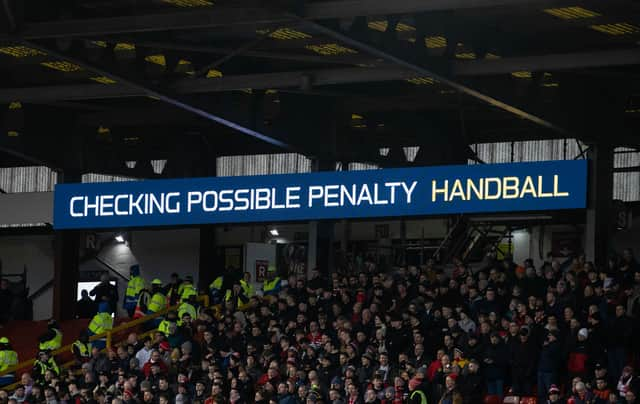Managers are frustrated, players fearful and fans up in arms - is VAR done for?


How many? Wrong question. Any discussion about the future of VAR must start by focusing not on the number of errors flagged up, but the nature of the mistakes being committed in its name. How bad? That’s more pertinent.
If the Video Assistant Referees currently operating the technology in Scottish football cannot consistently do the right thing on clear and obvious incidents, the objective judgement calls that require no subjective interpretation of events, we’re in trouble. Allowing Hibs to go public with details of the admission and apology wrung from the referee department this week isn’t going to buy the SFA much time on this front; as well as emboldening other clubs to follow suit, it could prompt a wider uprising against the machines and their operators.
Advertisement
Hide AdAdvertisement
Hide AdBecause no-one expects the Nicky Devlin handball in Saturday’s 2-2 draw between Aberdeen and Hibs at Pittodrie to be the last clear and obvious offence missed this season. It might not even be the worst between now and the end of the campaign.
Which is why it should spell the beginning of the end for this version of VAR – not the entire concept, but certainly its current iteration – in Scottish football. To carry on risks undermining all confidence in officials’ ability to make even the most basic decisions.
Until and unless the authorities can demonstrate that they know how to operate the technology to improve the game, it should be put on a shelf. Pulled out only for training exercises and dry run experiments, to be reintroduced when all the kinks have been ironed out.
Let the football folk get on with the football. Without wondering what fresh hell awaits them at the next stoppage of play.
Advertisement
Hide AdAdvertisement
Hide AdNow, you’ll have heard all the usual straw man arguments about expecting too much, nobody ever promised perfection etc. Don’t fall for them. Perfection is not only a long way removed from our current location. It never was so much as a mythical spot on the destination wish list.
Nobody with a working brain cell believed that VAR would get every call absolutely spot on. For starters, there’s just too much subjectivity in how the game is refereed for anyone to pretend that 100 per cent accuracy is even theoretically possible.
If this were just about the number of Key Match Incidents (KMIs) being fumbled by referees and their video assistants, we’d be in trouble. But this goes beyond merely counting cockups. The scale of the misjudgement involved in some of those human errors is where it gets really concerning.
We’re not talking about 50-50 calls. These are howlers, by any criteria. Awful decisions that boggle the mind and baffle the senses, leaving us wondering if we can believe our own eyes.
Advertisement
Hide AdAdvertisement
Hide AdThe Devlin handball at Pittodrie wasn’t even a close call. The Dons defender stuck his arm out and moved towards a ball that had travelled a long way from the boot of Hibs fullback Jordan Obita. It’s a textbook penalty.
The SFA admitting that referee David Munro should have been invited to take a second look at the incident on the pitch side monitor actually raised more questions for fans. Did Video Assistant Referee David Dickinson simply not get a proper replay showing the best angle? Or did he and his own assistant, Grame Leslie, just miss the offence despite watching everything again? It’s hard to know which is worse.
SFA head of referees Crawford Allan is adamant that VAR is here to stay. A good man, fine judge of the game and honest broker who makes himself available to managers looking to air a grievance or query a decision, he isn’t just spouting some corporate line; he believes the numbers prove that the system is working.
But this is more than just a statistical exercise. It’s an elite sporting competition where those on the front line – the players and coaches – have almost zero confidence in officials’ ability to reach the right decision.
Advertisement
Hide AdAdvertisement
Hide AdBecause every technical area now has a video screen that allows coaching staff to rewind and review incidents themselves while play carries on, they can see what the VAR sees. And they’re baffled by the inconsistency that results in one incident being referred for an on-field review, while another identical offence is waved aside.
The managers don’t trust it, while the players profess themselves deeply confused, especially when it comes to big penalty calls; penalising one out of every hundred holding offences at corner kicks or randomly pinging guys for handball has created a deep sense of uncertainty and injustice. And the fans hate the whole damned system, with its lengthy delays and baffling outcomes. Unless there is immediate and significant improvement, none of the above will change. And that is not a healthy state of affairs for a game so important to so many.
Comment Guidelines
National World encourages reader discussion on our stories. User feedback, insights and back-and-forth exchanges add a rich layer of context to reporting. Please review our Community Guidelines before commenting.